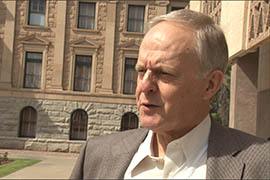Cronkite News has moved to a new home at cronkitenews.azpbs.org. Use this site to search archives from 2011 to May 2015. You can search the new site for current stories.
Experts: More than half of cancer cases in Arizona preventable
PHOENIX – Experts offered lawmakers some grim statistics Wednesday on cancer in Arizona, including a forecast of 11,400 deaths this year and a 50 percent increase in cancer cases by 2050.
However, one figure offered some hope of improvement: More than half of cancer cases in Arizona could be prevented by lifestyle changes such as not smoking and exercising more.
“There is lots of low-hanging fruit that we could get into that is going help us prevent cancer developing in the later parts of our population’s lives,” said Dr. Peter Lance, deputy director of the University of Arizona’s Cancer Center-Phoenix.
Lance said that 33 percent of cancers can be attributed to smoking alone and 20 percent can be attributed to obesity.
Addressing the House Committee on Health, he and other experts presented the State of Cancer in Arizona 2014, covering diagnoses, treatment and perspectives on where research is headed.
Brian Hummell, state director of government relations for the American Cancer Society’s Cancer Action Network, said lung cancer kills the most Arizonans, with a forecast of 2,840 deaths in 2014, about 25 percent of the projected total. He said efforts to curb smoking among Arizonans can reduce that.
“Tobacco is the leading cause of preventable death among Arizonans,” Hummell said.
Hummell and Lance acknowledged Arizona’s initiatives to reduce smoking among teens and young adults, including increased taxes, restrictions on smoking in public places and cessation programs.
But since 90 percent of lung cancers can be attributed to smoking tobacco, there’s still a long way to go, Lance said.
“There has been a steady decline in the young people that are getting to smoke, but by no means is it a finished or completed war,” he said.
Jessica McCaffrey, a senior representative for community engagement with the American Cancer Society, said defeating cancer is as much a matter of public policy as it is of scientific discovery.
“Every day elected officials like you make decisions that affect the lives of more than 11 million cancer survivors, their families, caregivers and even those at risk of developing cancer,” she said.
Dr. Keith Stewart, Mayo Clinic’s dean for research, highlighted the newest addition to its cancer treatment program: the proton beam gantry. Shaped like a wheel with the patient lying inside it, the device uses proton beams for cancer treatment to reduce the stress radiation has on organs and tissue. Mayo plans to have four of them installed by 2016.
“We think this will revolutionize care of pediatric cancers, rare cancers behind the eye, and even some of the more common cancers like prostate cancer will be safer and less toxic,” Stewart said.







